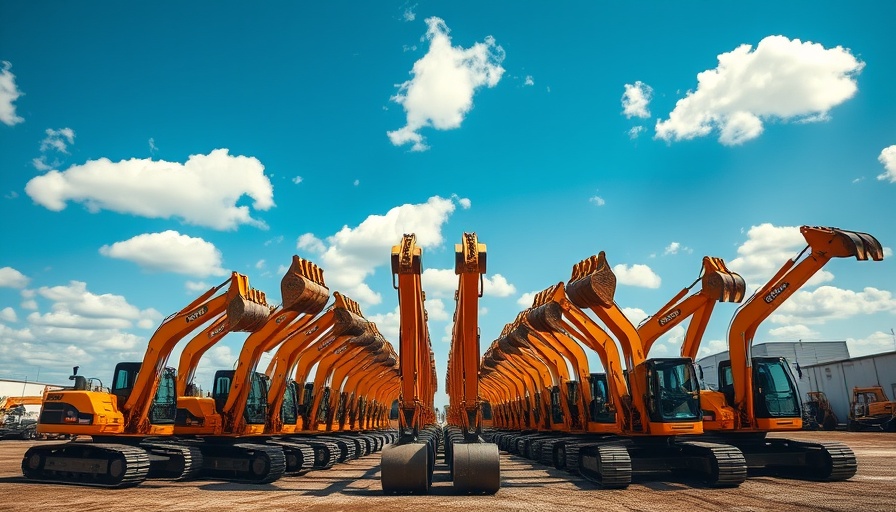
Affordable Mini Excavators Take Center Stage in the U.S. Market
In a refreshing move aimed at leveling the playing field for small business owners and independent contractors, Bull Equipment has officially entered the U.S. market with its lineup of affordable mini excavators. With a promise to deliver high-quality machinery at prices up to 40% lower than major competitors, Bull Equipment is set to disrupt the compact equipment industry.
What Makes Bull Equipment Stand Out?
At the forefront of Bull Equipment's approach is the belief that exceptional machinery doesn't have to come with inflated price tags. Fredrik Lundqvist, the company's owner, succinctly summarizes this vision: “High quality doesn’t have to mean high cost.” This ethos resonates particularly well with small-business owners who often face tough financial constraints. By offering a direct-to-consumer sales model that eliminates dealer markups, Bull Equipment provides a compelling alternative for those in the construction and landscaping sectors looking to save money without sacrificing quality.
Craftsmanship and Manufacturing
The excavators are manufactured in China, with essential parts sourced from reputable international suppliers, including Kubota and Parker. Lundqvist emphasizes a commitment to rigorous quality control through close collaboration with the factory, ensuring that the equipment not only meets but exceeds industry standards. Customers can feel confident knowing that each machine undergoes dual inspections—once before shipment and again upon arrival at their Hutto, Texas headquarters—prior to delivery.
Diverse Product Line Tailored for the U.S. Market
Bull Equipment's current lineup includes five models ranging from 1.2 to 4.0 tons, each designed with input from customer feedback. The standout among these is the 18-X Mini Excavator, starting at just $14,900. Equipped with a robust 19.5-horsepower Kubota D902 diesel engine and advanced hydraulic systems, this model caters to various digging and construction tasks with a competitive breakout force of up to 4,144 pounds. It allows for easy configuration, with standard options for different bucket sizes and a quick coupler for added versatility.
Other models in Bull Equipment's pipeline set to hit the U.S. market include:
- 12-X: Ultra-compact and ideal for tight spaces.
- 22-X: Features a larger lift capacity powered by a Kubota D1105 engine.
- 25-X: Incorporates a swing boom and wide cab for improved ergonomics.
- 40-X: A 4-ton class model designed for serious digging and grading projects.
Exciting Add-Ons: Expanding the Product Range
Alongside its mini excavator offerings, Bull Equipment is enhancing the user experience with a growing selection of attachments. Contractors can now purchase specialized tools such as augers, grading buckets, and rippers to further increase the utility of their machinery. This flexibility empowers users to customize their excavators for varied tasks, making Bull Equipment an appealing choice for contractors on a budget.
Customer Engagement and Accessibility
Understanding the importance of customer engagement, Bull Equipment allows buyers to place orders through various means—online, via telephone, or through email. With ships usually dispatched within a day, the turnaround time for acquiring new equipment is impressive. Also, customers can demo machines at the Texas headquarters or schedule on-site demonstrations, ensuring they can make informed purchasing decisions.
Industry Impact and Future Outlook
By entering the U.S. market, Bull Equipment not only brings affordable options but also challenges the established norms of pricing in the mini excavator sector. The company's vision aligns with the growing demand for cost-effective solutions in construction, paving the way for significant market competition. As independent contractors and small businesses navigate the complexities of rising operational costs, having access to quality machinery at reasonable prices is more crucial than ever.
In conclusion, Bull Equipment's entrance into the U.S. market signifies a significant shift towards affordability without compromising quality, making it a brand to watch for savvy contractors. As the landscape of compact machinery continues to evolve, future innovations and product developments from this company are likely to shape industry standards for years to come.
 Add Row
Add Row  Add
Add 




Write A Comment